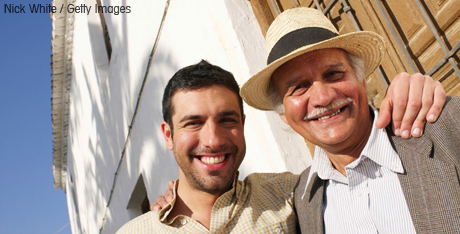At this time of year, we ready ourselves for Rosh Hashanah (The New Year) and Yom Kippur (The Day of Atonement). These High Holy Days bring many Jews to synagogue, many who are quite content to stay away for the rest of the year.
What is it about these High Holy Days that calls people to the synagogue? I believe it is the liturgy of forgiveness, for on these days we confess our sins to God and we ask God to forgive us.
Among the litany of wrongs we confess: heartlessness, selfishness, stubbornness. Misusing our minds, hardening our hearts, judging others, rejecting responsibility, and betraying trust. On and on we confess. We know we have done wrong, and we ask God for mercy, compassion and loving kindness. For pardon, for forgiveness.
What many of us forget is this: Showing up at synagogue only takes care of our wrongs against God.
What many of us forget is this: Showing up at synagogue only takes care of our wrongs against God. The rabbinic text Mishnah Yoma could not be clearer on this: For transgressions between human beings and God, Yom Kippur atones, but for transgressions between one human being and another, Yom Kippur does not make amends until the individuals put matters right between them. We have a responsibility to ask one another for forgiveness and a responsibility to forgive when asked.
Regardless of religious affiliation, the issue of forgiveness affects us all: Jew, Christian, Moslem, Buddhist, atheist and agnostic. Just walk into your local bookstore, and head to the psychology, philosophy, religion or self-help sections. The number of titles is dizzying. Clearly, forgiveness is part of the human condition, and we all labor with the task.
How do we go about asking others for forgiveness? And what if we are unaware that we have hurt someone? We often cover every possible wrong by saying to all we know something like: “If I have hurt you over the past year, please forgive me.” Yes, it is a blanket statement, but at least it’s something. Some of us go deeper in assessing our own failures, to offer more specific apologies. Others prefer instead to be collectors of injustices, too consumed recalling the wrongs others have committed against us to consider the wrongs we ourselves have committed.
How do we respond when others approach us and ask for forgiveness?
How do we respond when others approach us and ask for forgiveness? Do we decide that some hurts are too recent or too big to forgive? If we do choose to forgive (and it is most decidedly a choice), do we do so completely and with an open heart, or do we hang on to some splinter of a past wrong? If we do choose to forgive, what is our reason? Do we forgive because we understand that carrying around our hurt and anger consumes us, and in order to live we must let our hurt and anger go? Do we do it out of fear that if we don’t forgive others then we might not be forgiven? Or do we seek to model God, the Master of Forgiveness, the One who year after year is willing to give us yet another chance?
I make it my practice each year to reach out to my immediate family and ask for their forgiveness. With my parents and my siblings, this is usually done by phone as we are on opposite ends of the country. With my husband and son the request is in person, individually. Most of the time my requests are blanket requests … because as far as I know, I have not hurt the people I love beyond the day-to-day hurts for which I have already made specific amends. For having been forgiven thus far, I am grateful. It is no small thing to be forgiven.
We all have to be forgiven, by someone, for something.
There is a story told in Spain of a father whose rebellious teenage son ran away from home. This father searched for his son all over Spain but could not find him. As a last resort, he placed an ad in the Madrid newspaper that read: “Dear Paco, meet me in front of the newspaper office at noon. All is forgiven. I love you. Your father.” The next day, 800 Pacos showed up. This story highlights the need we all have to be forgiven, by someone, for something.
There is a statement in the High Holy Day liturgy that says, “God extends God’s hand to those who have done wrong.” In other words, God is willing to make the first move. If God is willing to make the first move, than maybe we, who are made in God’s image, would be wise to follow God’s example.
Since I am not getting any younger, I think it is time to dig deep within, to dust off some of the hurts I have tabled over the years because I was not yet ready to forgive them, and to face them head on. What about you?



